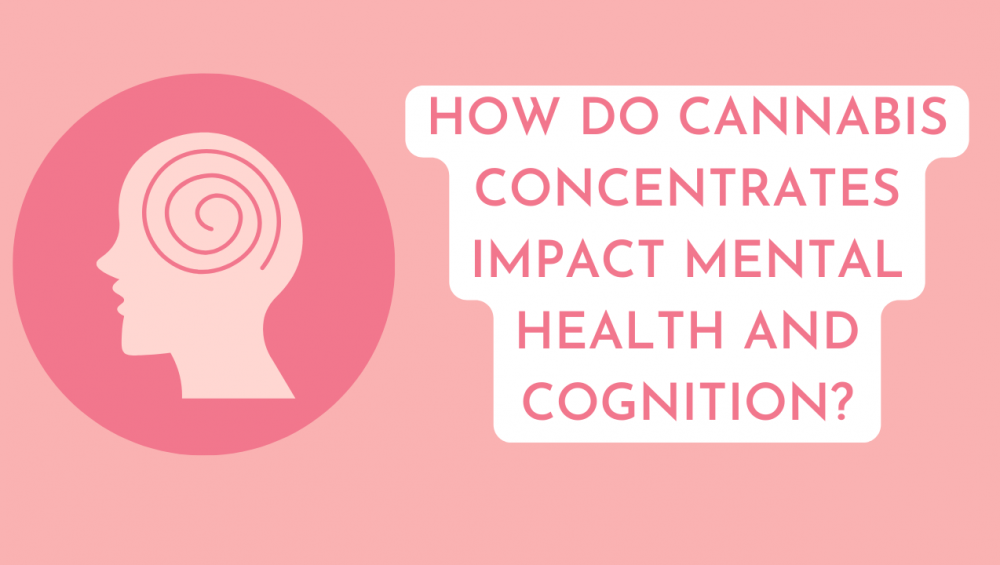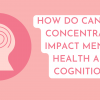It’s critical to look at the possible impacts of cannabis products, especially concentrates, on mental health and cognition as their usage and legalisation grow around the world. Cannabis has grown in popularity due to its many medical and recreational applications, but there are hazards and things to keep in mind when using it, especially when it comes to how it affects the mind. We’ll examine the possible advantages and disadvantages of using cannabis concentrates in regard to mental health in this blog article.
What Are Cannabis Products?
Scientifically referred to as Cannabis sativa, cannabis is a complex plant that includes flavonoids, terpenoids, alkaloids, and cannabinoids, among more than 500 other documented natural chemicals. THC, or delta-9-tetrahydrocannabinol, is the main psychoactive component of the plant that is used and abused recreationally. Cannabis has a long history of usage for a variety of goods, such as food, medicine, fibre, and oil.
Cannabis has been more and more popular in recent years, and it is now much easier to find, especially in the US. Cannabis is becoming more widely available to a larger population due to its legalisation for both medicinal and recreational purposes. Concerns concerning the possible impact of cannabis products, especially cannabis concentrates, on mental health and cognition have been brought up by this change in accessibility.
What Are Cannabis Concentrates?
Cannabis concentrates are highly potent extracts derived from the cannabis plant. These extracts are created using various extraction methods, which result in a concentrated form of cannabinoids and terpenes. The primary goal of concentrates is to enhance the potency and therapeutic effects of cannabis. Common types of cannabis concentrates include:
- Hash: Compressed resin from the cannabis plant’s trichomes.
- Wax: A sticky, butter-like substance with high THC content.
- Shatter: A brittle, glass-like concentrate with high THC levels.
- Oil: A liquid extract used in vape pens and edibles.
- Crumble: A concentrate with a crumbly texture and high cannabinoid content.
While cannabis concentrates are celebrated for their potency and fast-acting effects, they also raise questions about their potential impact on mental health and cognitive function.
The Endocannabinoid System and Mental Health
To understand the potential impact of cannabis concentrates on mental health, it’s crucial to delve into the endocannabinoid system. The endocannabinoid system is a complex network of receptors, endocannabinoids (naturally occurring compounds produced by the body), and enzymes that play a vital role in regulating various physiological processes.
Cannabinoid receptors, known as CB1 and CB2 receptors, are found throughout the body, with CB1 receptors being primarily located in the brain and central nervous system. These receptors interact with endocannabinoids and phytocannabinoids (cannabinoids from plants like cannabis) to regulate functions like mood, stress response, and reward signaling.
The Potential Benefits of Cannabis Concentrates
Before we delve into the impact of cannabis concentrates on mental health and cognition, it’s essential to acknowledge the potential benefits that these products can offer:
1. Pain Management
Cannabis, in various forms, has been used for centuries as a pain relief agent. Cannabis concentrates with high THC levels can provide effective pain management for individuals dealing with chronic pain conditions.
2. Anxiety and Stress Reduction
Some users report that cannabis concentrates help alleviate symptoms of anxiety and stress. Compounds like CBD, found in cannabis, may have anxiolytic properties.
3. Improved Sleep
Cannabis concentrates may aid in sleep regulation, helping individuals with insomnia or irregular sleep patterns achieve better rest.
4. Appetite Stimulation
Cannabis has a well-known reputation for stimulating appetite, making it valuable for individuals dealing with appetite loss due to medical conditions or treatments like chemotherapy.
5. Euphoria and Relaxation
For recreational users, cannabis concentrates can induce feelings of euphoria and relaxation, which may be pleasurable for some individuals.
The Role of THC in Mental Health
THC, the primary psychoactive compound in cannabis, acts as a partial agonist with high affinities for both CB1 and CB2 receptors. When THC binds to CB1 receptors in the brain, it can lead to various effects on mental health, including:
1. Altered Mood
THC can influence mood and emotions, potentially leading to feelings of euphoria or, in some cases, anxiety and paranoia.
2. Stress Response
THC can impact the body’s stress response, altering how individuals perceive and react to stressors.
3. Reward Pathways
THC can modulate the brain’s reward system, affecting motivation and the perception of pleasure.
4. Memory and Cognition
THC can disrupt memory and cognitive function, making it a topic of concern for mental health.
The Risks and Concerns
While cannabis concentrates offer potential benefits, they also pose risks, especially when it comes to mental health and cognitive function. Here are some of the key concerns:
1. Impaired Memory and Cognition
Cannabis use, particularly when high in THC, can impair short-term memory and cognitive functions. This is a significant concern, especially for individuals who need to stay alert and focused.
2. Psychosis and Mental Health Disorders
Heavy and prolonged cannabis use, particularly in high concentrations, has been linked to an increased risk of psychosis, schizophrenia, and other mental health disorders.
3. Dependence and Addiction
Cannabis use, especially with high THC concentrations, can lead to dependence and addiction, resulting in withdrawal symptoms when use is reduced or stopped.
4. Impact on Learning and Education
For students and individuals engaged in intellectual or educational pursuits, cannabis use may hinder concentration, learning, and academic performance.
5. Increased Anxiety and Paranoia
While some individuals experience anxiety reduction with cannabis, others may experience increased anxiety and paranoia, particularly with high-THC concentrates.
The Role of Kenabisa
1In your journey to understand the impact of cannabis concentrates on mental health and cognition, Kenabisa is a valuable resource. Kenabisa is a platform dedicated to providing accurate information and resources about cannabis, helping individuals make informed decisions regarding their use of cannabis products. Kenabisa aims to promote responsible and safe cannabis use by offering the following features:
- Education: Kenabisa provides comprehensive educational materials and articles about cannabis, its effects, and best practices for consumption.
- Resources: The platform offers a wide range of resources, including research articles, guidelines, and recommendations to help users navigate their cannabis journey.
- Community: Kenabisa fosters a community of individuals who share their experiences, insights, and questions related to cannabis use. This sense of community can be invaluable for those seeking support and advice.
- Experts: The platform features contributions from experts in the field of cannabis, ensuring that the information provided is accurate and up-to-date.
Making Informed Choices
To make informed choices about using cannabis concentrates and their impact on mental health and cognition, consider the following guidelines:
1. Dosing and Potency
Be mindful of the potency of the cannabis concentrate you choose. High-THC concentrates can have a more significant impact on cognition and mental health. Start with lower doses and gradually increase, if necessary.
2. Individual Sensitivity
Recognize that individual responses to cannabis can vary widely. What works well for one person may not be suitable for another. Pay attention to how your body reacts to cannabis concentrates.
3. Responsible Use
Use cannabis responsibly and in appropriate settings. Avoid operating heavy machinery, driving, or engaging in activities that require focus and attention while under the influence of cannabis.
4. Seek Professional Advice
If you have concerns about the impact of cannabis on your mental health, consult with a healthcare professional or a mental health expert. They can provide guidance and support tailored to your individual needs.
5. Be Informed
Stay informed about the latest research and developments in the field of cannabis. Platforms like Kenabisa can be valuable sources of information to help you make educated decisions.
In Conclusion
Cannabis concentrates, with their high potency and fast-acting effects, have the potential to impact mental health and cognition in various ways. While they offer benefits like pain relief, stress reduction, and improved sleep, they also come with risks, including impaired memory, cognitive function, and potential mental health concerns. To navigate your cannabis journey, it’s crucial to educate yourself, be mindful of dosing, and seek professional guidance if needed.
Kenabisa, with its dedication to providing accurate information and resources about cannabis, can be a valuable companion in your quest for responsible and informed cannabis use. Whether you’re a medical cannabis patient seeking relief or a recreational user looking for a pleasurable experience, making educated choices is essential for your well-being and safety.



